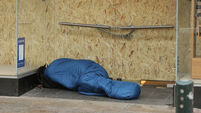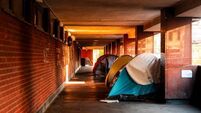Mick Clifford: Cork musician has his own lyrical way of protesting about the housing crisis
Every Thursday, Martin Leahy rises at 6.15am, gets into his car in village of Ballinadee and drives the 32km up the N71 to Cork City.
He knows a spot near Collins Barracks where he can park for free for the day but you have to get there early or it’s gone. Once parked up, he takes from the back seat his guitar case and a little sign that somebody gave him that has #housingcrisis printed across it.















